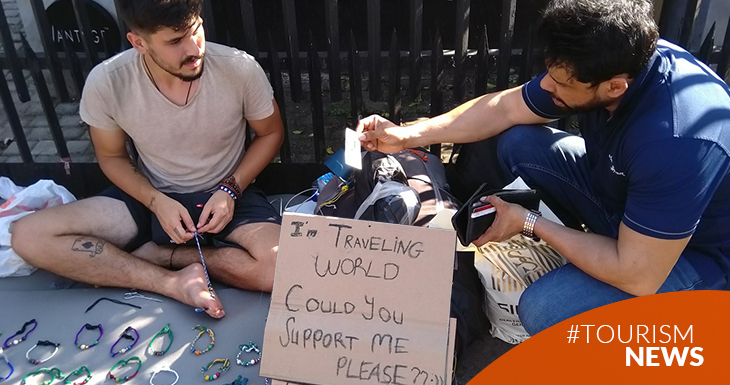In recent years, a new tourist trend has emerged that has captured travelers and experts attention around the world: the "begpackers". This trend, which combines the adventurous travel spirit with the search for financing in foreign destinations, has generated controversy and debate in the tourism industry.
Begpackers are a combination of beg from beggers meaning to beg and packer from bagpacker meaning backpacker, and in many places they are considered to be the least accepted of travelers. As the word says, these travelers dedicate themselves to begging in the places of the world to which they go without caring about the economic conditions of their inhabitants. Normally, they are young Westerners who visit the Asian Continent and Latin America.
Debate and criticism in many tourist destinations:
Some argue that "begpackers" are exploiting the generosity of local communities and taking advantage of their need, especially in countries with less developed economies. In addition, it is argued that this way of traveling shows a lack of respect towards local cultures and can contribute to reinforcing negative stereotypes about travelers.
While some give hugs with their 'blindfolded eyes' in exchange for a coin, others sell bracelets, play music or put on shows with their babies, a situation that has mainly filled the citizens of Asian countries with weariness.
Although begpackers travel all over the world, they are mainly seen in cities in Southeast Asia, such as Bangkok, Kuala Lumpur, Taipei and Hong Kong; and recently in some parts of Latin America. The inhabitants of these countries are outraged by this type of travelers who ask for money to survive, while there are thousands of poor families and people who do it to eat.
As a result of this weariness, in some of these places regulations and restrictions have been implemented to address this phenomenon (stricter requirements for tourists, such as the presentation of economic solvency proof or the requirement of an accommodation reservation before entering the country ).
Different public institutions and NGOs have decided to intervene showing their "total disagreement" with this form of tourism, and even the authorities of the most frequented destinations by begpackers have reacted by sending them to their respective embassies, as in the case of the island of Bali , Indonesian. At the moment, no legal or financial penalties have been imposed, but it could happen in the near future.
It is important to note that not all travelers looking to finance their trip in this way are considered "begpackers". Some may have particular circumstances or resort to this practice as a last resort. However, the term has mainly been associated with those who have the ability to afford their trip, but choose to beg rather than use their own resources.
Crowdfunding for travel:
One of the newest ways for begpackers to travel is through crowdfunding platforms, a way to finance a trip through donations from other people. Travelers can create a campaign on these platforms where they expose their itinerary and ask users to contribute money to their cause.
Social networks have also become a platform to share stories and opinions about this new tourist trend, which has amplified the global debate.
Although it is a valid way to travel, they are not well received by the majority, since with a large number of people asking for money to eat or support a family, asking for it to travel is debatable and is not healthy for the tourism industry.


